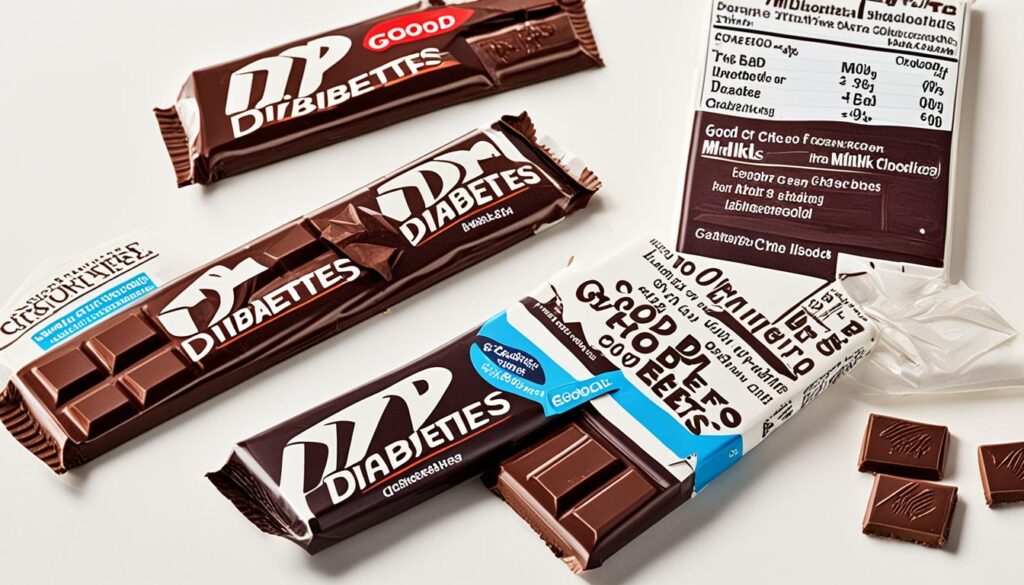Diabetes is a chronic condition that affects millions of people worldwide. Managing diabetes can be challenging, but recent research suggests that cocoa, the key ingredient in chocolate, may offer potential benefits for those with diabetes. This article will explore the connection between cocoa and diabetes, examining the nutritional benefits of cocoa and its potential impact on blood sugar regulation, cardiovascular health, and overall diabetes management.
Key Takeaways
- Cocoa is rich in antioxidants and flavonoids that may help manage diabetes.
- Cocoa may improve insulin sensitivity and glucose metabolism, leading to better blood sugar regulation.
- Consuming cocoa in moderation may have positive effects on cardiovascular health in people with diabetes.
- Incorporating cocoa into a diabetic diet requires careful consideration and balance.
- Dark chocolate is generally a better option for individuals with diabetes compared to milk chocolate.
Introduction to Cocoa and Diabetes
Diabetes is a complex metabolic disorder characterized by high blood sugar levels due to the body’s inability to produce or use insulin effectively. There are two main types of diabetes: type 1 and type 2. Type 1 diabetes is an autoimmune condition where the body attacks the insulin-producing cells in the pancreas, while type 2 diabetes is often linked to lifestyle factors, such as obesity and physical inactivity.
Understanding Diabetes
Individuals with type 1 diabetes require insulin injections or the use of an insulin pump to manage their blood sugar levels, as their body is unable to produce sufficient insulin. On the other hand, type 2 diabetes is typically associated with the body’s resistance to insulin, often resulting from factors like a sedentary lifestyle and poor dietary choices. Understanding the different types of diabetes is crucial for developing effective management strategies.
Cocoa: A Potential Ally
Interestingly, recent research suggests that cocoa, the key ingredient in chocolate, may offer potential benefits for individuals with diabetes. The compounds found in cocoa, particularly flavanols, have been studied for their potential impact on blood sugar regulation, insulin sensitivity, and overall diabetes management.
As researchers continue to explore the relationship between cocoa and diabetes, the potential benefits of cocoa for diabetes have become an area of increasing interest and investigation.
Nutritional Benefits of Cocoa

Cocoa is a rich source of beneficial nutrients and compounds that may contribute to its potential role in diabetes management. Firstly, cocoa is high in antioxidants, particularly flavanols, which are a type of polyphenol. These antioxidants can help neutralize harmful free radicals and reduce oxidative stress, both of which are associated with the development and progression of diabetes.
Rich in Antioxidants
The nutritional value of cocoa is largely attributed to its high antioxidant content. Cocoa is one of the richest dietary sources of antioxidants, surpassing even berries and green tea. These antioxidants, particularly the flavanols, play a crucial role in combating the oxidative stress that is often linked to the onset and progression of diabetes.
Source of Flavonoids
In addition to its antioxidant properties, cocoa is also a valuable source of flavonoids, a class of plant-based compounds with numerous health benefits. The flavonoids found in cocoa, such as epicatechin and catechin, have been shown to possess anti-inflammatory properties that may be beneficial for individuals with diabetes.
Potential Anti-Inflammatory Properties
The anti-inflammatory properties of cocoa’s flavonoids have been the subject of extensive research. Inflammation is a key factor in the development and progression of diabetes, and the compounds found in cocoa may help to alleviate this inflammation, potentially contributing to improved diabetes management.
Can cocoa help in managing diabetes?

The potential benefits of cocoa for diabetes management have been the subject of ongoing research. While the exact mechanisms are not fully understood, several studies have suggested that the compounds found in cocoa, particularly flavanols, may have a positive impact on various aspects of diabetes management.
One of the key ways in which cocoa may help in managing diabetes is through its potential impact on blood sugar regulation. Flavanols in cocoa have been shown to improve insulin sensitivity, which is crucial for effectively regulating blood sugar levels. By enhancing insulin sensitivity, cocoa may help the body better utilize glucose, leading to improved glucose metabolism and potentially lower blood sugar levels.
Additionally, cocoa may offer benefits for cardiovascular health, which is particularly important for individuals with diabetes who are at a higher risk of developing cardiovascular diseases. The potential impact of cocoa on blood pressure and cholesterol levels may further contribute to the overall management of diabetes and its associated complications.
However, it’s important to note that while the potential benefits of cocoa for diabetes are promising, it should be consumed in moderation as part of a balanced and healthy diet. Incorporating cocoa into a diabetic diet can be a beneficial strategy, but individuals should be mindful of the sugar and calorie content in certain cocoa-based products.
Cocoa and Blood Sugar Regulation

One of the key ways in which cocoa may help in managing diabetes is through its potential impact on blood sugar regulation. The flavanols found in cocoa have been shown to improve insulin sensitivity, which is crucial for effectively regulating blood sugar levels. By enhancing insulin sensitivity, cocoa may help the body better utilize glucose, leading to improved glucose metabolism and potentially lower blood sugar levels.
Insulin Sensitivity
Cocoa’s high flavanol content has been linked to enhanced insulin sensitivity. Insulin is the hormone responsible for regulating blood sugar levels by facilitating the uptake of glucose into cells. When insulin sensitivity is improved, the body can more effectively use the available insulin, leading to better control of blood sugar levels. This can be particularly beneficial for individuals with diabetes, who often experience insulin resistance, a key factor in the development and progression of the condition.
Glucose Metabolism
In addition to improving insulin sensitivity, the compounds in cocoa may also have a positive impact on glucose metabolism. By enhancing the body’s ability to utilize glucose, cocoa may help maintain healthy blood sugar levels and reduce the risk of blood sugar spikes or crashes. This could be especially advantageous for individuals with diabetes, who often struggle to maintain stable blood sugar levels throughout the day.
Cocoa and Cardiovascular Health

Diabetes is closely linked to an increased risk of cardiovascular disease, and managing both conditions is essential. Interestingly, cocoa may also have a positive impact on cardiovascular health, which could be beneficial for individuals with diabetes.
Improving Blood Pressure
Numerous studies have suggested that the flavanols found in cocoa may help in improving blood pressure levels. These compounds have been shown to enhance the production of nitric oxide, a molecule that helps dilate blood vessels and improve blood flow. By supporting healthy blood pressure, cocoa may contribute to a lower risk of hypertension and related cardiovascular complications often experienced by those with diabetes.
Reducing Cholesterol Levels
Cocoa’s potential impact on cholesterol levels is another area of interest for individuals with diabetes. The flavanols in cocoa have been found to have a positive effect on both total cholesterol and LDL (bad) cholesterol levels. By helping to lower cholesterol, cocoa may play a role in reducing the risk of cardiovascular health issues that are commonly associated with diabetes.
| Cardiovascular Health Metric | Impact of Cocoa |
|---|---|
| Blood Pressure | Potential to improve through increased nitric oxide production and blood vessel dilation |
| Cholesterol Levels | May help reduce total and LDL (bad) cholesterol levels |
The positive effects of cocoa on cardiovascular health can be particularly beneficial for individuals with diabetes, as they often face a higher risk of developing related conditions. By incorporating cocoa into a balanced, diabetes-friendly diet, individuals may be able to support their overall cardiovascular well-being and potentially mitigate some of the associated risks.
Incorporating Cocoa into a Diabetic Diet

For individuals with diabetes, incorporating cocoa into their diet can be a beneficial strategy, but it’s essential to do so in moderation. While cocoa may offer potential benefits, it is important to remember that chocolate and cocoa-based products are also high in sugar and calories, which can be problematic for diabetes management.
Moderation is Key
When it comes to how to incorporate cocoa in a diabetic diet, the recommended cocoa intake for diabetes is crucial. Experts advise individuals with diabetes to consume cocoa and chocolate in moderation, as the high sugar and fat content can have a negative impact on blood sugar levels. The tips for consuming cocoa with diabetes include choosing dark chocolate with a high percentage of cocoa solids and limiting the portion size to a small square or two per day.
| Recommendation | Rationale |
|---|---|
| Choose dark chocolate with at least as much fiber as sugar | The fiber can help slow the absorption of sugar, mitigating the impact on blood sugar levels. |
| Avoid varieties processed with alkali | Alkali processing can reduce the beneficial flavanol content in cocoa. |
| Limit portion size to a small square or two per day | Consuming larger amounts of cocoa or chocolate can contribute to excess calorie and sugar intake, which is not recommended for diabetes management. |
By following these guidelines, individuals with diabetes can enjoy the potential benefits of cocoa while minimizing the risks associated with excessive sugar and calorie consumption.
Dark Chocolate vs. Milk Chocolate

When it comes to incorporating cocoa into a diabetic diet, the choice between dark chocolate and milk chocolate can make a significant difference. Generally, dark chocolate is considered a better option compared to milk chocolate for individuals with diabetes.
Dark chocolate contains a higher percentage of cocoa solids, which are rich in beneficial flavanols. These flavanols have been shown to positively impact blood sugar regulation and insulin sensitivity, making dark chocolate a more diabetes-friendly choice. In contrast, milk chocolate typically contains more added sugars and fewer cocoa solids, which can be less favorable for individuals managing diabetes.
| Characteristic | Dark Chocolate | Milk Chocolate |
|---|---|---|
| Cocoa Solids Content | Higher (typically 70% or more) | Lower (typically 10-50%) |
| Sugar Content | Lower | Higher |
| Flavanol Content | Higher | Lower |
| Potential Benefits for Diabetes | May help with blood sugar regulation and insulin sensitivity | Less favorable for diabetes management |
When incorporating chocolate into a diabetic diet, it’s crucial to consume it in moderation and be mindful of portion sizes, as both dark and milk chocolate can still contain significant amounts of sugar and calories. Individuals with diabetes should consult with their healthcare provider or a registered dietitian to determine the appropriate amount and type of chocolate that best fits their dietary needs and glucose management goals.
Precautions and Side Effects

While the potential benefits of cocoa for individuals with diabetes are promising, it’s crucial to be aware of potential precautions and side effects. Cocoa and chocolate products can interact with certain medications, particularly those used to manage diabetes, such as insulin and oral hypoglycemic agents.
Potential Interactions
Individuals with diabetes who are taking medications to regulate their blood sugar levels should exercise caution when consuming cocoa or chocolate. The flavanols and other compounds in cocoa may interact with diabetes medications, potentially leading to fluctuations in blood sugar levels. It’s essential to consult with a healthcare provider before incorporating cocoa or chocolate into the diet to ensure proper management of diabetes and to avoid any adverse interactions.
In addition to potential medication interactions, consuming too much cocoa or chocolate can also lead to potential side effects for individuals with diabetes. These may include gastrointestinal discomfort, increased calorie and sugar intake, and weight gain, all of which can negatively impact diabetes management.
| Precautions when Consuming Cocoa with Diabetes | Possible Side Effects of Cocoa for Diabetes | Interactions Between Cocoa and Diabetes Medications |
|---|---|---|
|
|
|
By being mindful of these precautions and potential side effects, individuals with diabetes can safely and effectively incorporate cocoa and chocolate into their diet as part of a comprehensive diabetes management plan.
Scientific Research and Studies

The potential benefits of cocoa for managing diabetes have been the subject of numerous scientific studies and ongoing research. Several studies have investigated the impact of cocoa and its various compounds on different aspects of diabetes, including blood sugar regulation, insulin sensitivity, and cardiovascular health.
For instance, a 2016 study found that cocoa flavanols can help manage diabetes by exhibiting antidiabetic actions. Research has also shown that cocoa extracts and procyanidins can inhibit key digestive enzymes, which may contribute to improved glucose tolerance. Additionally, cacao liquor procyanidin extract has been found to enhance glucose uptake in skeletal muscle, leading to better glucose tolerance.
Monomeric cocoa catechins have been observed to enhance beta-cell function by increasing mitochondrial respiration, while (−)-epicatechin can induce the recovery of mitochondria in simulated diabetes, potentially through the endothelial nitric oxide synthase pathway. Cocoa flavonoids, such as epicatechin, have also been found to protect pancreatic beta cells against oxidative stress and toxicity.
Furthermore, studies have shown that cocoa phenolic compounds can improve insulin signaling, modulate glucose production, and protect hepatic cells against high glucose-induced oxidative stress. High-molecular-weight cocoa procyanidins have demonstrated enhanced insulin-enhancing and insulin mimetic activities compared to smaller procyanidins in human primary skeletal muscle cells.
These scientific studies on cocoa and diabetes, research on the effects of cocoa on diabetes, and evidence-based benefits of cocoa for diabetes suggest that the consumption of cocoa and its various compounds may play a promising role in the management of this chronic condition. However, further research is still needed to fully elucidate the mechanisms and long-term implications of incorporating cocoa into a comprehensive diabetes management plan.
Lifestyle Factors for Diabetes Management

While the potential benefits of cocoa for diabetes management are promising, it’s important to note that it should be viewed as one component of a comprehensive approach to managing the condition. Alongside the potential benefits of cocoa, individuals with diabetes should also focus on other key lifestyle factors for managing diabetes, such as regular exercise and physical activity, as well as weight management.
Exercise and Physical Activity
Regular physical activity is widely recognized as a crucial component of effective diabetes management. Exercise can help improve insulin sensitivity, enhance glucose metabolism, and promote overall cardiovascular health, all of which are essential for individuals with diabetes. Engaging in a variety of exercises, such as aerobic activities, strength training, and flexibility exercises, can help individuals with diabetes better manage their condition and reduce the risk of related complications.
Weight Management
Maintaining a healthy weight is another important lifestyle factor for managing diabetes. Excess weight, particularly in the form of abdominal or visceral fat, is closely linked to the development and progression of type 2 diabetes. By focusing on weight management through a balanced diet and regular physical activity, individuals with diabetes can improve their insulin sensitivity, reduce inflammation, and lower their risk of cardiovascular disease and other complications.
In summary, while the potential benefits of cocoa for diabetes management are compelling, a holistic approach that incorporates lifestyle factors like exercise, physical activity, and weight management is crucial for effectively managing this chronic condition.
Conclusion
In conclusion, the potential benefits of cocoa for managing diabetes are an intriguing area of research and exploration. The flavanols and other beneficial compounds found in cocoa may have a positive impact on various aspects of diabetes management, including blood sugar regulation, insulin sensitivity, and cardiovascular health.
The key takeaways on using cocoa for diabetes suggest that the antioxidant properties and insulin-enhancing activities of cocoa components can contribute to improved glucose metabolism and better overall diabetes management. Scientific studies have demonstrated the protective effects of cocoa on pancreatic beta cells, insulin signaling, and lipid metabolism, providing a promising avenue for incorporating cocoa into a comprehensive diabetes management plan.
Ultimately, the final thoughts on cocoa for diabetes management highlight the need for further research to fully understand the mechanisms and long-term benefits. While the current evidence is encouraging, it is essential to consume cocoa in moderation and as part of a balanced, healthy diet. By combining the potential advantages of cocoa with other lifestyle factors, such as regular exercise and weight management, individuals with diabetes may find additional support in managing their condition and improving their overall health and well-being.

Leave a Reply